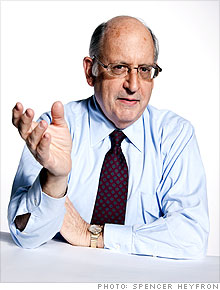Search News
FORTUNE -- The folks who run investment partnerships like Blackstone are proving to be fabulous dealmakers once again. At least when it comes to looking after their own interests.
The case in point: pending legislation in Congress to increase the 15% capital gains tax rate that these folks pay on their share of their investors' profits, while mere mortals pay up to 35% (plus another 2.9% for Medicare) on "earned income" such as fees and salaries. The share of the profits, typically 20%, is called "carried interest."

Given the outrage against Wall Street, the noisy campaign to sharply increase taxes on "the rich," and the fact that carried interest looks a lot more like a (fully taxable) incentive fee than a (less-taxed) capital gain, you'd think it would be a slam dunk to get Congress to close this loophole.
But you'd be wrong.
Here's what's going on. The legislation, introduced by Rep. Sandy Levin (D-Mich.), calls for private equity firms, venture capital firms and real estate investment partnerships to get half their carried interest income treated as capital gains in 2011 and 2012, and for 25% to 45% of it to be treated as capital gains from 2013 on.
This would cost them a lot more tax than they're paying now. But it's still a far better tax deal than middle-class wage earners get. For that matter, it's a far better deal than investment managers who work for mutual funds or Wall Street houses get on their fully taxable performance bonuses.
Misery loves company
Next year, with tax rates on both regular income and capital gains going up, the carried interest types' 50-50 split would give them an effective tax rate of 31%, rather than the 20% capital gains rate. Now, take me, someone who makes a (low) six-digit income, but is stuck in the phase-out bracket of the Alternative Minimum Tax. If my income were split 50-50 next year, my rate would be 32% to 33%.
I'm well-off, but far from rich by any definition except the Obama administration's. So my sympathy for private equity types paying higher taxes on their carried interest income is, shall we say, extremely limited.
Now, the "to be sure" part. Public investors in Blackstone (BX) and other publicly traded partnerships would get stuck paying higher taxes, because some of their share of the partnerships' income would be taxed as ordinary income rather than as capital gains. They'd also have somewhat higher gains (or lower losses) when they sell their partnership units. Sorry for the vagueness, but I can't get anyone to put a number on this.
That's not nice. But you know what? That's life. It's probably not a big enough difference to really matter to public investors, who own 16% of Blackstone. Another 10% is owned by China's sovereign wealth fund, which I'm sure can look after itself.
Besides, when Blackstone first went public in 2007, it gave the selling unit holders, such as company founders Steve Schwarzman and Pete Peterson, a sweet tax-sharing deal that in effect had the public partners cover about half the capital gains that selling partners had to pay.
Other now-public partnerships, such as Pzena (PZN) and Och-Ziff (OZM), did similar transactions. It was all legal, and all disclosed. But it showed that managers didn't mind having public investors in effect paying taxes above their share of the partnership's income, albeit indirectly.
Not all taxes are equal
I think it's perfectly fair for the managers to be taxed at higher rates than now on their carried interest. Even if they pay less than I do, this isn't a bad compromise.
What does seem unfair is the provision that would force managers to pay ordinary income taxes on sales of the business. By contrast, owners of other businesses get to treat sales proceeds as capital gains.
The legislation is written this way to close an obvious loophole that managers could probably use to avoid the higher carried-interest rate. I'll spare you the details -- it has to do with the fact that the managers get "profit interests" in the investment partnerships they created, rather than getting a contract that pays them a piece of investors' realized profits.
Even if Congress enacts this legislation, I'm sure that when the time comes, the big hitters in the investment management world will figure out a way to solve their problem. They always do. ![]()






| Company | Price | Change | % Change |
|---|---|---|---|
| Ford Motor Co | 8.29 | 0.05 | 0.61% |
| Advanced Micro Devic... | 54.59 | 0.70 | 1.30% |
| Cisco Systems Inc | 47.49 | -2.44 | -4.89% |
| General Electric Co | 13.00 | -0.16 | -1.22% |
| Kraft Heinz Co | 27.84 | -2.20 | -7.32% |
| Index | Last | Change | % Change |
|---|---|---|---|
| Dow | 32,627.97 | -234.33 | -0.71% |
| Nasdaq | 13,215.24 | 99.07 | 0.76% |
| S&P 500 | 3,913.10 | -2.36 | -0.06% |
| Treasuries | 1.73 | 0.00 | 0.12% |
|
Bankrupt toy retailer tells bankruptcy court it is looking at possibly reviving the Toys 'R' Us and Babies 'R' Us brands. More |
Land O'Lakes CEO Beth Ford charts her career path, from her first job to becoming the first openly gay CEO at a Fortune 500 company in an interview with CNN's Boss Files. More |
Honda and General Motors are creating a new generation of fully autonomous vehicles. More |
In 1998, Ntsiki Biyela won a scholarship to study wine making. Now she's about to launch her own brand. More |
Whether you hedge inflation or look for a return that outpaces inflation, here's how to prepare. More |